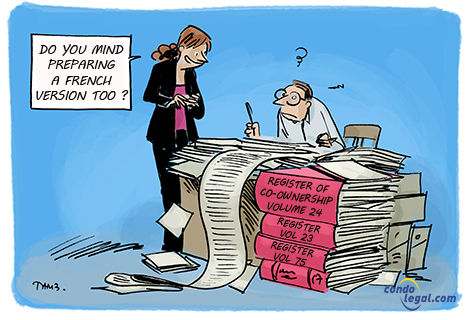 The declaration of co-ownership is a document that encompasses all the rules specific to a syndicate of co-owners, to ensure the proper functioning of a building and cohesion among its occupants. It also specifies the conditions of use and enjoyment of the common and private portions. Life in co-ownership is not static. It evolves and is subject to changes, which will sooner or later be demanded by the co-owners. This evolution may sometimes lead to amendments to the declaration of co-ownership, provided that the modalities set forth by the law are respected.
The declaration of co-ownership is a document that encompasses all the rules specific to a syndicate of co-owners, to ensure the proper functioning of a building and cohesion among its occupants. It also specifies the conditions of use and enjoyment of the common and private portions. Life in co-ownership is not static. It evolves and is subject to changes, which will sooner or later be demanded by the co-owners. This evolution may sometimes lead to amendments to the declaration of co-ownership, provided that the modalities set forth by the law are respected.
Thus, any modification to the declaration of co-ownership usually involves a vote at a meeting of co-owners. The voting process to proceed with such a modification varies depending on the nature of the change to be made.
Formalities
A true instruction manual for a syndicate of co-ownership, the declaration of co-ownership is divided into three parts: the Constituting act of co-ownership, the Description of the fractions and the By-laws of the immovable. This division into three segments is very important, because the Civil Code of Québec provides specific formalities according to which section is the object of an amendment.
An amendment to the By-laws of the immovable can take place at a meeting of the co-owners, who will adopt the new by-law which will then be filed in the register of the co-ownership. The notarial deed is not required in this situation, but the syndicate has to be cautious and ensure that the amendment is in conformity with the Law, case law and the compulsory rules of the declaration of co-ownership.
However, an amendment to the Constituting act of co-ownership or the Description of the fractions shall be recorded in a notarial deed and published. Therefore at the occasion of the amendment to the Constituting act, the use of an expert in co-ownership law is essential and unavoidable.
The amendment to the declaration of co-ownership is usally adopted at a meeting of the co-owners. The latter receive a notice of call of the meeting, accompanied by the agenda announcing the draft deed of amendment, as well as the deed itself. This amendment may have been requested by the Board of Directors or by a co-owner, who can put in a request to change the agenda within five days of its receipt.
Variable majorities
Every amendment to the declaration of co-ownership should in principle be voted upon, yet they are not necessarily subject to the same majority rules. These vary according to the nature of the proposed amendments. Thus, the majority legally required at the meeting of co-owners depends on the following parameters:
To change the destination of the immovable, or to permit the holding of a fraction by several persons having a right of periodical and successive enjoyment ("time-sharing"), the vote shall be taken by a double majority (75% all the co- owners of the immovable representing 90% of the votes of all the co-owners);
To change the Description of the fractions or the Constituting act of co-ownership, without changing the destination of the immovable, the vote shall be taken by an enhanced majority. This is a new majority, which came into effect on January 10, 2020, under Bill 16. Provided for in the new version of article 1097 of the Civil Code of Quebec, this enhanced majority requires three-quarters of the votes of the co-owners present and represented at the meeting.
To change the By-laws of the immovable, the vote shall be taken by a absolute majority (50% plus one of the votes of the co-owners present or represented at the meeting).
Limitation
The Law does not allow the meeting of the co-owners, upon any majority whatsoever, to impose on a co-owner a change in the relative value of his fraction, to the destination of his private portion or the use he may make of it (article 1102 of the Civil Code of Quebec). Such an initiative is possible only if he consents.
Moreover, Article 1056 of the Civil Code of Quebec provides that the declaration of co-ownership, and consequently any amendments to it, cannot restrict the rights of co-owners, unless if this is justified (in some cases) by the destination of the immovable, its characteristics or its location.
Furthermore, certain provisions of the declaration of co-ownership repeat verbatim, so called “public order provisions” - and thus mandatory – of the Civil Code of Québec. This is so for the majorities prescribed in Articles 1096, 1097, 1098 and 1108. Yet, Article 1101 states that is deemed unwritten any stipulation of the declaration of co-ownership changing those majorities, either by increasing or the reducing them.
Two exceptions to the rule
The co-owners of contiguous private portions may request the Board of Directors that the boundaries of their private portion be altered, without the need to obtain the approval of the general meeting of the co-owners. On this issue, Article 1100 of the Civil Code of Quebec requires only:
To change the boundaries of contiguous private portions, the syndicate must amend the declaration of co-ownership and the cadastral plan at the expense of the owners requesting it. In addition, the act of amendment must mention the consent of the latter, as well as that of the creditors and the syndicate.
Furthermore, Article 53 of An Act respecting the implementation of the reform of the Civil Code of Quebec specifies the following provisions: when a declaration of co-ownership (published before 1 January 1994) establishes the rule of unanimous approval for any decision changing the destination of the immovable, this rule is maintained, notwithstanding article 1101 of the Civil Code of Québec. If the amendment to the declaration of co-ownership affects the destination of the immovable, the rule of unanimous approval of the co-owners is absolutely necessary.
The importance of the notary
When an amendment to the declaration of co-ownership has been voted by the general meeting, it does become not effective immediately. For it to be enforceable, a notary must receive the deed of amendment, if it affects the Constituting act of co-ownership or the Description of the fractions. This authentic deed must also be published in the Land register under the immatriculation number of the common portions and that of the private portion, in those cases the latter would be directly impacted.
You should know that this publication in the Land Register is essential for a deed of amendment to become enforceable against co-owners, and even more so towards new purchasers. However, changes to the By-laws of the immovable are not received before a notary nor published. They are simply filed in the internal register of the syndicate of co-ownership.
 WHAT YOU SHOULD KNOW! One can amend a declaration of co-ownership without a general meeting of co-owners. A resolution signed by all co-owners has the same value as if it had been adopted during a meeting of co-owners.
WHAT YOU SHOULD KNOW! One can amend a declaration of co-ownership without a general meeting of co-owners. A resolution signed by all co-owners has the same value as if it had been adopted during a meeting of co-owners.
 WHAT TO KEEP IN MIND: In principle, the procedure of amendment is provided for in the declaration of co-ownership (Constituting act). An experimented notary or lawyer in this field can assess the exact nature of the proposed changes, with a view of informing the syndicate of the required majorities as the case may be.
WHAT TO KEEP IN MIND: In principle, the procedure of amendment is provided for in the declaration of co-ownership (Constituting act). An experimented notary or lawyer in this field can assess the exact nature of the proposed changes, with a view of informing the syndicate of the required majorities as the case may be.
 WARNING! Whatever the nature of the amendment, it must be inscribed on the agenda of a general meeting. In addition, the draft deed of amendment must be attached to the notice of call sent to all owners.
WARNING! Whatever the nature of the amendment, it must be inscribed on the agenda of a general meeting. In addition, the draft deed of amendment must be attached to the notice of call sent to all owners.


